Timeline of Trump’s shifting justifications for Soleimani killing
The Trump administration makes several contradicting statements as it explains why the US killed Iran’s Soleimani.
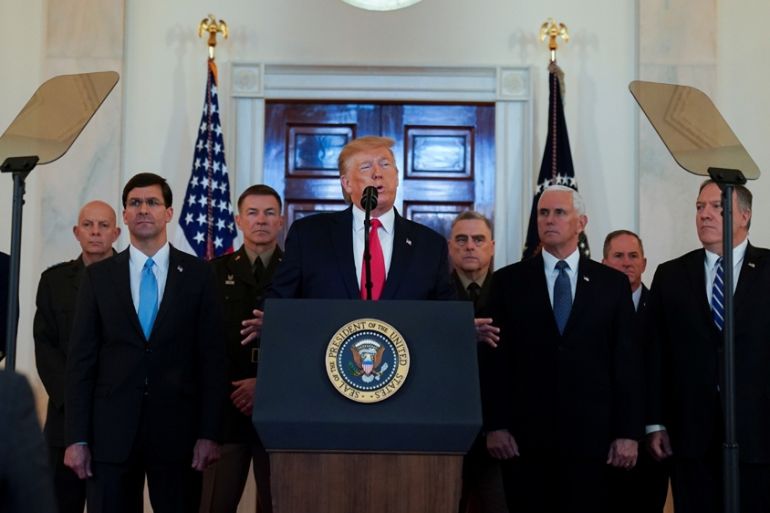
The White House added to its ever-evolving list of justifications for killing top Iranian commander Qassem Soleimani last week when in a memo addressed to Congress, it did not specifically cite the “imminent threat” the Trump administration had previously said the Iranian general posed in justifying its January attack.
In a legally-mandated memo, the White House told Congress that Trump “directed” the strike that killed Soleimani “in response to an escalating series of attacks in preceding months by Iran and Iran-backed militias on the United States forces and interests in the Middle East”.
Keep reading
list of 3 itemsLeaked recording shows Iran knew its missiles hit Ukrainian plane
The mystification of Qassem Soleimani
The unclassified memo continued: “The purposes of this action were to protect United States personnel, to deter Iran from conducting or supporting further attacks against United States forces and interests, to degrade Iran’s and Quds Force-back militia’s ability to conduct attacks, and to end Iran’s strategic escalation of attacks.”
Although the notice references that the threat of “further attack existed”, the memo makes no mention and gives no evidence of the “imminent attacks” the Trump administration initially gave as a justification for killing Soleimani.
The memo “directly contradicts the president’s false assertion that he attacked Iran to prevent an imminent attack against United States personnel and embassies,” Democrat Eliot Engel, the chairman of the House Committee on Foreign Affairs state in a statement responding to the Trump administration notice.
“The administration’s explanation in this report makes no mention of any imminent threat and shows that the justification the President offered to the American people was false, plain and simple,” Engel added.
The Trump administration’s shifting justifications have been slammed by politicians, including by those within the president’s own party.
Last week, the Republican-led Senate passed a resolution that would limit Trump’s ability to take further military action against Iran without congressional approval. Eight Republicans joined Democrats in passing the measure following criticism from legislators that the administration had offered scant intelligence to justify killing Soleimani – an action that many had feared would lead to outright war.
The Trump administration did not notify Congress before killing Soleimani, and subsequent intelligence briefings with legislators – a more in-depth explanation to eight Senate and House leaders on January 7 and less-detailed briefings with the other members of the House and Senate on January 8 – did little to allay concerns that the administration had not proven a specific threat was imminent.
How pressing any threat actually was is significant to the attack’s national and international legality.
In the US, the use of military force must be approved by Congress. However, there are several caveats that offer discretionary latitude to the president, especially when it comes to self-defence, enshrined in the US Constitution. The 1973 War Powers resolution sought to restrain some of that presidential power, but those constraints were again widened under subsequent War Powers resolutions passed following the September 11, 2001, attacks in the US.
The president and government officials, in the weeks after the strike, have been vague, inconsistent, and at times contradictory when discussing intelligence surrounding the attack. That opacity has extended even to the administration’s description of US casualties following Iran’s retaliatory attack on an Iraqi military base that houses US troops: First, Trump said there were no injuries. The military later said that 11 US soldiers were being treated for what the president dismissed as “headaches”. That number soon ballooned to 34, then 64, before the military announced that 109 soldiers were eventually diagnosed with mild traumatic brain injuries.
“[The administration] ‘releasing information’ is almost an overstatement,” Glenn Carle, a former deputy national intelligence officer, told Al Jazeera. “What they’ve done is respond to pressure with momentary comments and dissembling.”
Aaron David Miller, a senior fellow at Carnegie Endowment for International Peace, described the administration’s messaging following the attack as “woefully inadequate”.
“We’re all wandering in the dark here,” Miller told Al Jazeera.
“They really haven’t made a case in a compelling way to justify why they needed to do this now,” said Miller, which “has raised a number of serious questions about the administration’s motives”.
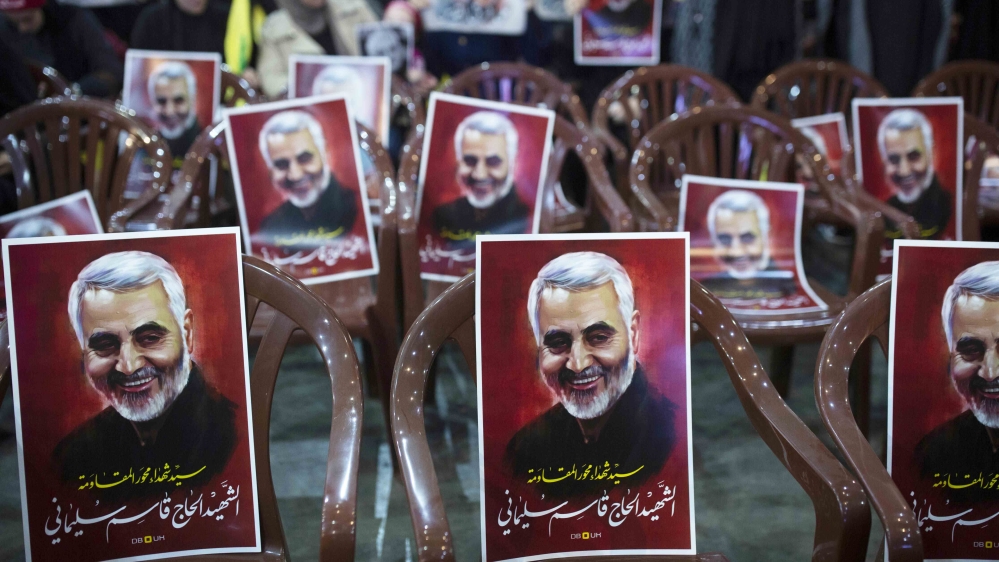
The confused release of information “doesn’t mean their entire argument [for the strike] was wrong, though,” Michael O’Hanlon, a senior fellow in foreign policy at the Brookings Institution, told Al Jazeera, “only that they should have explained the nature of their evidence and their analysis, including the enormous uncertainties.”
But the administration’s shifting justifications and refusal to publicly present evidence, has left legislators with more questions than answers. They are now preparing to ask Secretary of State Mike Pompeo those questions when he testifies before the House Committee on Foreign Affairs later this month.
“The administration has dissembled on this issue for long enough. The decision to kill Soleimani escalated tensions with Iran and risked plunging us into a war with Iran that the American people don’t want and that Congress hasn’t authorised,” Engel said. “This spurious, after-the-fact explanation won’t do. We need answers and testimony, so I look forward to Secretary Pompeo testifying before the committee at an open February 28.”
As legislators look to get more answers, here’s a timeline of the Trump administration’s shifting justifications.
January 3: ‘Imminent and sinister attacks’
Shortly after Soleimani, along with Iraqi militia leader Abu Mahdi al-Muhandis, was killed on January 3, January 2 in the US, while leaving the international airport in Baghdad, the Trump administration gave its first comments on the strike.
“General Soleimani was actively developing plans to attack American diplomats and service members in Iraq and throughout the region,” the Department of Defense said in a statement, adding the Iranian general had been behind the December 27 attack on an Iraqi military base that killed an American civilian contractor.
The statement (released on January 2 in the US) added: “This strike was aimed at deterring future Iranian attack plans.”
Trump later tweeted: “General Qassem Soleimani has killed or badly wounded thousands of Americans over an extended period of time, and was plotting to kill many more…but got caught!”
“He should have been taken out many years ago!”
General Qassem Soleimani has killed or badly wounded thousands of Americans over an extended period of time, and was plotting to kill many more…but got caught! He was directly and indirectly responsible for the death of millions of people, including the recent large number….
— Donald J. Trump (@realDonaldTrump) January 3, 2020
Trump on January 3 also addressed reporters for the first time after the killing from Mar-a-Lago in Palm Beach, Florida, saying Soleimani was “plotting imminent and sinister attacks on American diplomats and military personnel, but we caught him in the act and terminated him.”
That night, on CNN, Pompeo echoed the sentiment, saying the general was “actively plotting in the region to take actions, a big action, as he described it, that would have put dozens if not hundreds of American lives at risk.”
“We know it was imminent. This was an intelligence-based assessment that drove our decision-making process,” he said.
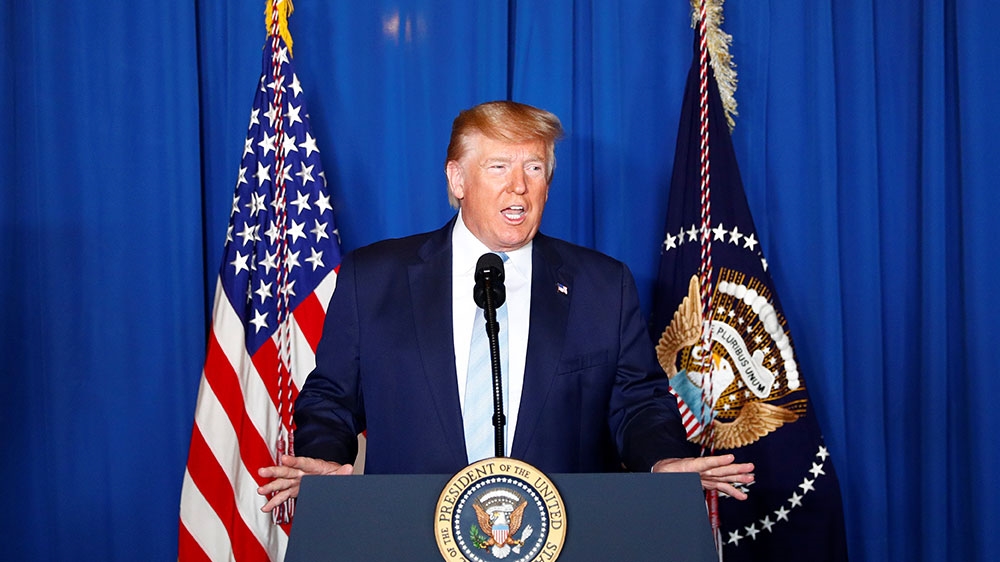
January 5: ‘Notification to Congress’
Amid anger from some legislators that Congress had not been notified of the strike, Trump tweeted on January 5: “These Media Posts will serve as notification to the United States Congress that should Iran strike any U.S. person or target, the United States will quickly & fully strike back, & perhaps in a disproportionate manner. Such legal notice is not required, but is given nevertheless!”
The tweet appeared to be the president’s attempt to satisfy the 1973 War Powers Act, which requires that the president notify Congress within 48 hours of any military action.
In response, the House Foreign Affairs Committee tweeted: “This Media Post will serve as a reminder that war powers reside in the Congress under the United States Constitution. And that you should read the War Powers Act. And that you’re not a dictator.”
This Media Post will serve as a reminder that war powers reside in the Congress under the United States Constitution. And that you should read the War Powers Act. And that you’re not a dictator. https://t.co/VTroMegWv0
— House Foreign Affairs Committee (@HouseForeign) January 5, 2020
Pompeo also told NBC’s Meet the Press programme that the “imminent threat” was “never one thing … It’s a collective. It’s a full situational awareness of risk and analysis.”
January 6: ‘It was imminent, and it was very, very clear in scale, scope’
In a news conference on January 6, Army General Mark Milley, the chairman of the Joint Chiefs of Staff, rebutted what he characterised as critics allegations that intelligence leading up to the attack was “was razor-thin”.
“[Defense Secretary Mark Esper] and I saw that intelligence. And I will be happy, when the appropriate time comes in front of the proper committees and anybody else, through history and every – I’ll stand by the intelligence I saw, that – that was compelling, it was imminent, and it was very, very clear in scale, scope,” Milley said.
“Did it exactly say who, what, when, where? No. But he was planning, coordinating, and synchronising significant combat operations against US military forces in the region and it was imminent,” he added. “Those of us who were involved in the decision making of that, we would have been culpably negligent to the American people had we not made the decision we made.”
January 7: ‘Exquisite’
A day later, on January 7, Esper gave a classified briefing to the so-called “Gang of Eight” which includes Senate Majority Leader Mitch McConnell, Senate Minority Leader Chuck Schumer, Speaker of the House Nancy Pelosi, House Minority Leader Kevin McCarthy, as well as ranking Democrats and Republicans from the intelligence committees of both chambers.
Beforehand, Esper described the intelligence that led to the attack as “exquisite”, a term in spy parlance that usually refers to sophisticated reconnaissance that includes records of precise movements or communications.
The legislators did not comment on the classified briefing.
Pompeo said in a news conference on January 7, “If you’re looking for imminence, you need to look no further than the days that led up to the strike that was taken against Soleimani.”
January 8: ‘Demeaning to the Constitution,’ legislators say
Hours after Iran responded with retaliatory strikes on two Iraqi bases that house US troops, officials briefed the House and Senate on the intelligence that led to the attack that killed Solemani.
While most Republicans say the briefing was satisfactory, Republican Mike Lee called it “absolutely insane” and the “worst briefing” on military action he’s seen in his nine years as the Senate.
“They had to leave after 75 minutes while they’re in the process of telling us that we need to be good little boys and girls and run along and not debate this in public,” Lee said.
“I find it insulting and I find it demeaning to the Constitution of the United States,” he said.
The January 8 briefing prompted Lee and fellow Republican Senator Rand Paul to back the Senate War Powers resolution on Iran. Six other Republicans later joined them in backing the bill.
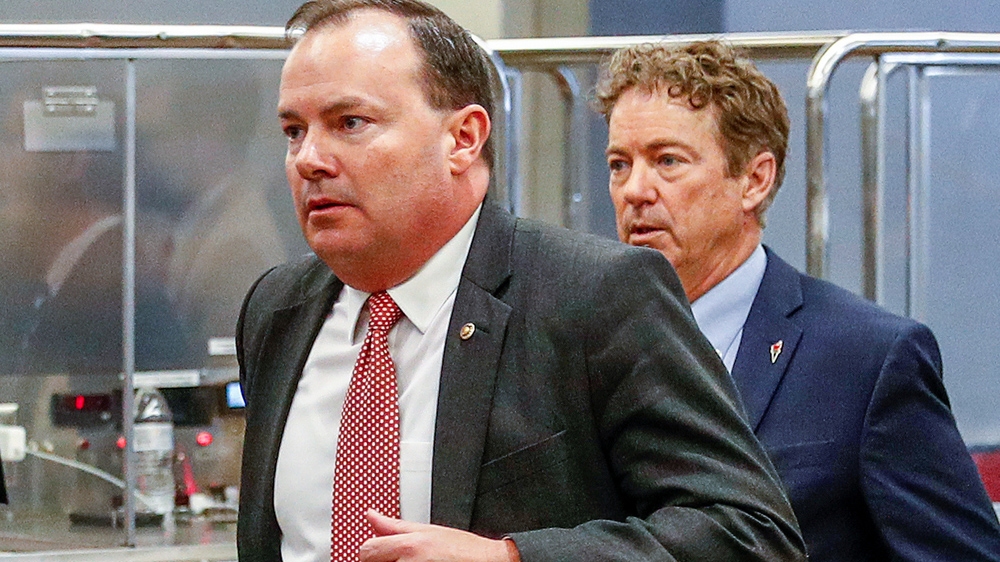
January 9: ‘We don’t know precisely when, where’
At a White House event on January 9, Trump said he chose to assassinate Soleimani “because they were looking to blow up our [Baghdad] embassy”.
“We also did it for other reasons that were very obvious. Somebody died – one of our military people died,” Trump said, in an apparent reference to the civilian contractor killed on December 27.
Later in the day, Mike Pompeo, appearing on the Fox News channel, said officials who did the congressional briefing did a “dynamite job” and accused critics of “using this as a political axe to grind”.
Pompeo reiterated that the attacks were “imminent”, adding, “We don’t know precisely when, and we don’t know precisely where … But it was real.”
“There was a real opportunity here and there was a real necessity here. We made the right decision. The president made the right call.”

January 10: ‘I believe it would have been four embassies’
Pompeo, when pushed by reporters at a White House briefing on January 10, said the attacks could be “imminent” without necessarily knowing exactly when and where they would happen: “Those are completely consistent thoughts. I don’t know exactly which minute. We don’t know exactly which day it would’ve been executed. But it was very clear: Qassem Soleimani himself was plotting a broad, large-scale attack against American interests. And those attacks were imminent.”
During an interview with Fox News later in the day, Trump said: “I can reveal that I believe it would have been four embassies. And I think that probably Baghdad already started.”
He added: “But Baghdad certainly would have been the lead. But I think it would have been four embassies, could have been military bases, could have been a lot of other things too. But it was imminent and then all of a sudden, he was gone.”
January 11: ‘No evidence of imminent attacks on four embassies,” Democrats say
Democrats who attended the wider Congressional briefings said that information on threats to four embassies had not been presented.
“Let’s be clear – if there was evidence of imminent attacks on four embassies, the Administration would have said so at our Wednesday briefing. They didn’t,” Democratic Senator Chris Murphy tweeted on January 11. “So either Fox News gets higher level briefings than Congress…or…wait for it…there was no such imminent threat.”
Let's be clear – if there was evidence of imminent attacks on four embassies, the Administration would have said so at our Wednesday briefing. They didn't.
So either Fox News gets higher level briefings than Congress…
or…wait for it…
there was no such imminent threat.
— Chris Murphy (@ChrisMurphyCT) January 10, 2020
January 12: ‘I didn’t see one [specific intelligence] in regard to four embassies’
Adam Schiff, appearing on the CBS programme Face the Nation, said there was no discussion of in the Gang of Eight briefings that “these are the four embassies being targeted”.
Appearing on the same programme, Defense Secretary Esper said he “didn’t see” intelligence that indicated that four embassies were being targeted, saying instead he thought the president was relaying his belief that they “could have been” targeted.
“I didn’t see one [specific intelligence] with regard to four embassies. What I’m saying is I share the President’s view that probably, my expectation was they were going to go after our embassies. The embassies are the most prominent display of American presence in a country,” Esper said on January 12.
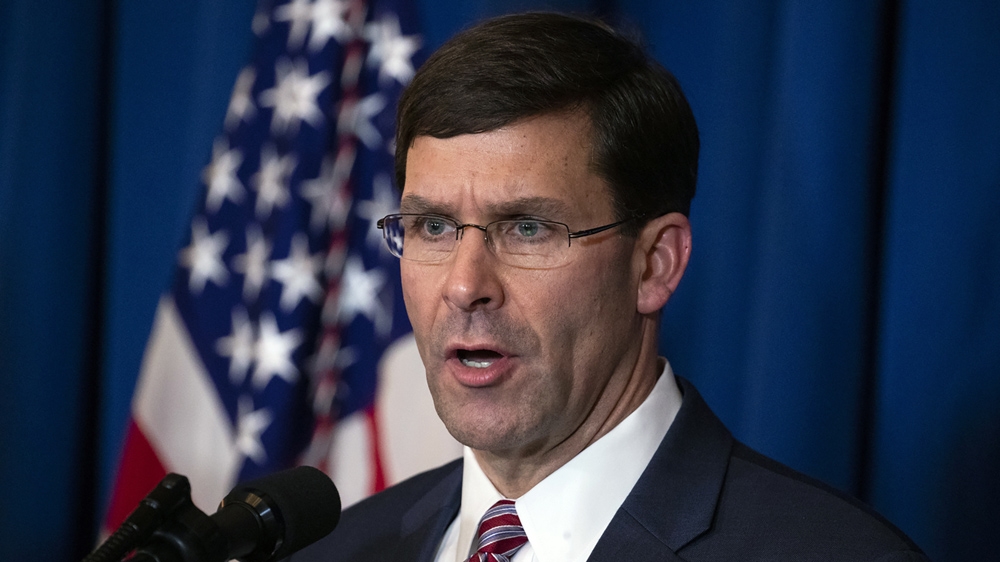
January 13: ‘It Doesn’t Really Matter’
In a tweet on January 13, Trump reasserted that the threat from Soleimani was “imminent”, but added, ” it doesn’t really matter because of his horrible past!”
Meanwhile, Attorney General William Barr told reporters that Soleimani was a “legitimate military target” and the strike was a “legitimate act of self-defence”.
While Barr said there was “intelligence” of an imminent attack, he added, “I do believe that this concept of imminence is something of a red herring … I think when you’re dealing with a situation where you already have attacks under way, you know there is a campaign that involves repeated attacks on American targets, I don’t think there’s a requirement frankly for knowing the exact time and place of the next attack. And that certainly was the position of the Obama administration when it droned leaders of terrorist organisations.”
The red herring here is from Bill Barr. When there is a campaign that involves repeated attacks on American targets, then there is no excuse for the administration not to have sought an authorization from Congress, as the Constitution demands. Otherwise, imminence is required. https://t.co/4klbkPymaI
— Justin Amash (@justinamash) January 13, 2020
Critics charged that Barr’s comments underlined the administration’s shift towards emphasising a general, versus specific, threat posed by Soleimani.
“The red herring here is from Bill Barr. When there is a campaign that involves repeated attacks on American targets, then there is no excuse for the administration not to have sought an authorization from Congress, as the Constitution demands. Otherwise, imminence is required,” tweeted independent Michigan congressman Justin Amash.
January 14: ‘Vital for the American public to know,” Democrats say
Nine Democratic Senators demanded a new classified briefing in a letter to the Director of National Intelligence Joseph Maguire on January 14.
“It is vital for the American public to know if intelligence is being manipulated or inaccurately represented by their government to justify an assassination of a foreign official,” the nine Democrats wrote in a letter to Joseph Maguire, the director of national intelligence.
January 17: ‘Prepared to use all legal means,” Democrats say
On January 17, Representative Eliot Engel, the Democratic chairman of the House Foreign Affairs Committee, scheduled a public hearing with Pompeo for Wednesday, January 29, which has reportedly been rescheduled for later in February.
“This hearing deals with the most weighty issues with which our country and Congress deals, including the use of force. Therefore, I consider your testimony to be of extremely high importance and am prepared to use all legal means to ensure your attendance,” Engel wrote to Pompeo.
Engel had previously tried to schedule a hearing on January 14, but Pompeo did not appear. Engel had also previously threatened to subpoena Pompeo.

January 18: ‘Then all of a sudden, boom’
Trump gave a minute-by-minute account of the strike that killed Soleimani in remarks to a re-election and Republican National Committee fundraising dinner in the ballroom of his Mar-a-Lago club in Palm Beach, Florida on January 18, according to audio obtained by CNN.
In his most detailed comments on the strike yet, Trump recounted the scene as he monitored the strikes from the White House Situation Room when Soleimani was killed.
“They’re together, sir,” Trump said military officials told him. “Sir, they have two minutes and 11 seconds. No emotion. ‘Two minutes and 11 seconds to live, sir. They’re in the car, they’re in an armoured vehicle. Sir, they have approximately one minute to live, sir. Thirty seconds. Ten, 9, 8 …’ “
“Then all of a sudden, boom,” he said. “‘They’re gone, sir. Cutting off.'”
“I said, ‘where is this guy?'” Trump continued. “That was the last I heard from him.”
In the audio, according to the news channel, Trump did not repeat that Soleimani was an imminent threat.
Trump said Soleimani was “saying bad things about our country” before the strike, which led to his decision to authorise his killing.
“How much of this s*** do we have to listen to?” Trump asked in the audio, “How much are we going to listen to?”
February 14: ‘Escalating series of attacks in preceding months’
In a notice to Congress, the Trump administration laid out what it described as its legal framework for the Soleimani strike, saying it was authorised under both the Constitution and the 2002 Authorisation of Use of Military Force Against Iraq. The note also defended the legality of the attack under international law, saying that even without the threat of a future attack, the killing was still justifiable as self-defence.
It did not directly mention the imminent threat that was used as early justification.
While saying the notice “directly contradicts” the administration claim that the attack was meant to thwart an imminent attack, Chairman of the House Committee on Foreign Affairs Engel also called the administration’s invocation of the 2002 Iraq war resolution “absurd”.
“The 2002 authorisation was passed to deal with Saddam Hussein. This law had nothing to do with Iran or Iranian government officials in Iraq. To suggest that 18 years later this authorization could justify killing an Iranian official stretches the law far beyond anything Congress ever intended,” Engel said.
He added he “looked forward” to Pompeo testifying in a February 28 hearing.